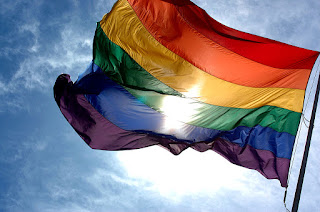Growing up, if I knew any gay people, I didn't know that they were gay. It wasn't exactly safe to be "out" back in the seventies. I heard and repeated anti-gay slurs without much thought and was oblivious to the implications of the casual bigotry that surrounded me and I was a part of.
I made it all the way to 1988, when I was thirty years old before I met someone who was openly gay, or at least until I became aware of such a person. I remember being mildly surprised that these people were "regular people", but quickly got over whatever residual prejudice that was lurking in my brain.
Several years before this I moved from my native New York City to western Nebraska, where I was part of a religious group that was unpopular with the mainstream churches. Due to my membership in this group I and my roommates were subject to discrimination in jobs and housing and the targets of verbal (and sometimes physical) abuse. As a card-carrying member of the majority, I had never experienced this before, and growing up somewhat sheltered, had never even witnessed it. The treatment that I received was shocking to me. But what stuck in my mind was, despite all the hatred that was targeted at me, nothing would have happened if I had showed up in town and gone to one of the local churches, or simply kept my mouth shut about my religious beliefs. In short, I could have passed. If I had one day renounced my membership in this religious group, I would have been accepted. But what about racial minorities, or gender discrimination? Some people just couldn't "pass" for members of the majority. My experiences in western Nebraska set the tone for my attitudes about discrimination and prejudice for the rest of my life.
Except for an interlude of a few years in the nineties.
This same religious group underwent a radical change in the late eighties and early nineties. The group's leader, who had succeeded the group's founder several years earlier, became extremely vocal in his opposition to homosexuality. He became more and more adamant about how homosexuality was the lowest of the low of sins and how acceptance of homosexuality was undermining "the ministry" (one of the ways our religious group identified itself). I am ashamed to say that I bought into it. Oh, not at first. When it first began I questioned why homosexuality was singled out, but eventually my objections were drowned in my desire to align myself with what I thought were biblical truths.
In 2000, in the aftermath of scandals that caused this leader to resign in disgrace, I became disenchanted with the group and eventually was asked to leave after it was discovered that I was posting on a website hostile to the group. It didn't take long for my opinions to "snap back" to the positions that I held before the anti-gay hysteria of my former group once the fog of religious dogma was lifted from my eyes.
Those days are times that I am not proud of and I cringe at some of the things that I said and the way I acted. But for the most part, my defining experience was that of experiencing discrimination and I never want to be on the side that delivers it ever again.

No comments:
Post a Comment